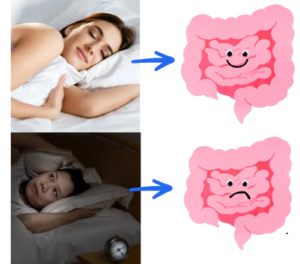Exploring the Essential Link Between Quality Sleep and Optimal Digestive Health
Sleep is not merely an indulgence; it is a vital biological function that plays a significant role in supporting our digestive health. The complex interplay between sleep and digestion involves various physiological mechanisms that harmoniously interact. Our body’s circadian rhythm, often referred to as the internal biological clock, synchronises both sleep patterns and digestive activities. This synchronisation is observable in the regularity with which individuals experience hunger at specific times daily, highlighting the body’s remarkable ability to operate in accordance with its natural biological cycles.
Maximising Your Digestive Health Through the Importance of Restorative Sleep 
Sleep is crucial for the body’s natural ability to heal, rejuvenate, and restore its various systems. The deeper stages of sleep are particularly essential for these restorative functions. During these profound stages, the organs, tissues, and cells that make up the digestive system not only enter a state of relaxation but also engage in vital repair processes. The body prioritises cellular repair and regeneration during deep sleep, particularly concerning the renewal of the cells lining the digestive tract. These cells face continuous wear and tear due to exposure to food particles and digestive enzymes, making their regeneration essential for maintaining the integrity of the gastrointestinal lining, which in turn enhances the efficiency of digestion.
Deep sleep also plays a crucial role in bolstering the immune system, which is particularly vital for the digestive system. The gut contains specialised immune cells that are activated by the beneficial bacteria residing within it. These immune cells are essential for protecting the gut and the entire digestive system from harmful microorganisms, thus ensuring a balanced population of bacteria in the gut ecosystem.
Furthermore, the organs within the digestive system are critical for detoxification, aiding in the removal of waste and harmful substances from the body. Deep sleep enhances this detoxification process by optimising the functionality of the liver and kidneys, enabling these organs to perform at their best. The synergistic relationship between sleep and detoxification significantly contributes to promoting overall digestive health and wellness.
Examining the Connection Between Sleep Patterns and Gut Motility
An essential aspect of digestion is the efficient movement of food and waste through the digestive tract, a process commonly known as gut motility. This process experiences significant alterations during sleep. Throughout both deep and light sleep, the rate of gut motility is considerably diminished. This reduction is a necessary adaptation, allowing the digestive system to conserve energy, which is redirected towards repairing digestive tissues. By conserving energy in this manner, the digestive process is optimised to function more effectively during waking hours, enhancing both nutrient absorption and waste elimination.
The migrating motor complex signifies a series of contractions that occur during fasting periods, including during sleep. This cycle is crucial for gut motility, as it effectively removes lingering food particles and residues from the digestive system. This natural cleansing mechanism of the digestive tract reduces the risks of bacterial overgrowth, thereby fostering a healthy gut environment. Notably, the migrating motor complex is most active during the night, when individuals are fasting and asleep, underscoring the importance of sleep in maintaining the health of the digestive system.
As dawn approaches, gut motility gradually increases, preparing the digestive system to efficiently process and digest food. This rise in motility can also initiate the first bowel movement of the day, illustrating the finely tuned connection between sleep and gut motility. Understanding this relationship is essential for optimising digestive health and enhancing overall well-being.
Exploring Hormonal Influences on Sleep and Digestive Functionality
Ghrelin, widely recognised as the hunger hormone, plays a pivotal role in stimulating appetite. Conversely, leptin communicates to the brain that the stomach is full, helping to prevent overeating. Together, these hormones are essential to appetite regulation; however, their functions can be adversely affected by insufficient sleep.
Even a single night of inadequate sleep can trigger elevated levels of ghrelin, which can increase appetite and often lead to cravings for carbohydrates. This experience is frequently termed feeling ‘hangry’. Compounding this issue, levels of leptin can decrease following a night of insufficient sleep, disrupting the signals that indicate fullness. This creates a challenging scenario where individuals may overeat and struggle to recognise their body's signals to stop eating. Although occasional poor sleep may not have severe consequences, chronic insomnia can lead to serious digestive problems, including gut inflammation, liver disorders, gastroesophageal reflux disease, inflammatory bowel disease, and even colorectal cancer, along with contributing to weight gain.
Assessing the Impact of Sleep Disruption on Digestive Health
Disruptions to sleep can result in a myriad of digestive issues. Factors such as shift work, especially night shifts, and experiencing jet lag can significantly disturb sleep patterns and throw the body’s internal clock into disarray. Additionally, consuming late-night meals or having irregular meal times can adversely affect the quality of sleep. The circadian rhythm that governs sleep is intrinsically tied to natural sunlight, which plays a crucial role in maintaining a healthy sleep-wake cycle.
Unfortunately, in today’s technology-driven world, many individuals find themselves spending the majority of their daytime indoors, leading to decreased exposure to natural light. This shift has resulted in increased exposure to blue light emitted by devices such as laptops, televisions, and smartphones, further disrupting the sleep cycle and sleep patterns, particularly when this exposure occurs shortly before bedtime.
The cumulative effects of these factors can lead to serious digestive issues, including diarrhoea, ulcers, inflammatory bowel disease, or disturbances in the delicate balance between beneficial and pathogenic bacteria in the gut. This imbalance can also compromise the integrity of the gut lining, exacerbating challenges related to digestive health.
Boosting Microbiome Health with Quality Sleep Practices
Microbiome refers to the trillions of microorganisms residing in the gut, comprised mainly of beneficial bacteria known as probiotics, as well as viruses, fungi, and potentially harmful bacteria. These microorganisms are vital for not only overall health but also for digestive health. They enhance the immune response and aid in digestion, promoting the synthesis of specific vitamins, enzymes, hormones, and amino acids. Recent research has uncovered a significant correlation between the microbiome and sleep, indicating that disruptions in sleep or chronic insomnia can adversely affect the balance of these microbes, ultimately impacting digestive health and overall well-being.
Decoding the Complex Relationship Between Microbiome Health and Sleep Quality
The relationship between sleep and microbiome health is intricate and multifaceted. Poor sleep can have a negative impact on microbiome health, while an imbalanced microbiome can also detrimentally affect sleep quality. To understand this complex connection, one study identified a correlation between a higher prevalence of certain bacterial types in the gut and quicker sleep onset, alongside fewer night awakenings. Although this article cannot encompass all findings, the key takeaway is that nurturing a diverse and thriving population of beneficial bacteria in the gut is crucial for achieving optimal sleep, effective digestion, and maintaining overall health.
Examining the Links Between Stress, Sleep, and Digestive Wellness
A common consequence of stress and anxiety is disrupted sleep. Conversely, these mental health challenges can also adversely affect the physical health and functionality of the digestive system. Such disturbances can result in altered gut motility and contribute to complications such as indigestion, ulcers, and irritable bowel syndrome. A significant factor in this dynamic is the effect of the so-called stress hormone, cortisol.
Understanding the Impact of Cortisol on Digestive Processes
When cortisol levels rise, the body enters a fight-or-flight state. This physiological response causes blood flow to be redirected to vital areas such as the heart, brain, lungs, and muscles while diminishing flow to the digestive system. This reaction prepares the individual to either confront danger or escape, a response that was essential for survival during prehistoric times.
In contemporary settings, however, stressors are often less life-threatening, such as financial concerns, workplace stress, or inadequate sleep. While the short-term redirection of blood flow may be beneficial in acute situations, chronic stress can adversely affect the digestive system, particularly concerning gut motility. This can lead to symptoms including constipation, diarrhoea, indigestion, gas, and bloating. Thus, adopting effective stress management techniques is essential for supporting both gut health and achieving restorative sleep.
Ensuring sufficient sleep is vital for maintaining a healthy digestive system, as the interrelationship between sleep and digestion is inherently intertwined. Prioritising effective sleep hygiene practices is crucial for achieving restorative sleep. This includes minimising exposure to blue light from electronic devices, adhering to a consistent sleep schedule, creating a cool, dark sleeping environment, avoiding food intake within two hours before bedtime, and ensuring exposure to natural light during the day, particularly in the morning.
References
Understanding Digestive Health and Circadian Rhythms
Exploring Sleep Dysfunction and Digestive Conditions
Examining the Link Between the Gut Microbiome and Sleep
Investigating Stress and Its Effects on the Digestive System
The Article: How Sleep Affects Your Digestive System appeared first on https://janestevensnutrition.com
The Article: Sleep’s Impact on Your Digestive System Explained appeared first on https://janestevens.net
The Article Sleep’s Impact on Digestive Health Explained Was Found On https://limitsofstrategy.com
The Article Sleep’s Impact on Digestive Health Uncovered found first on https://electroquench.com

